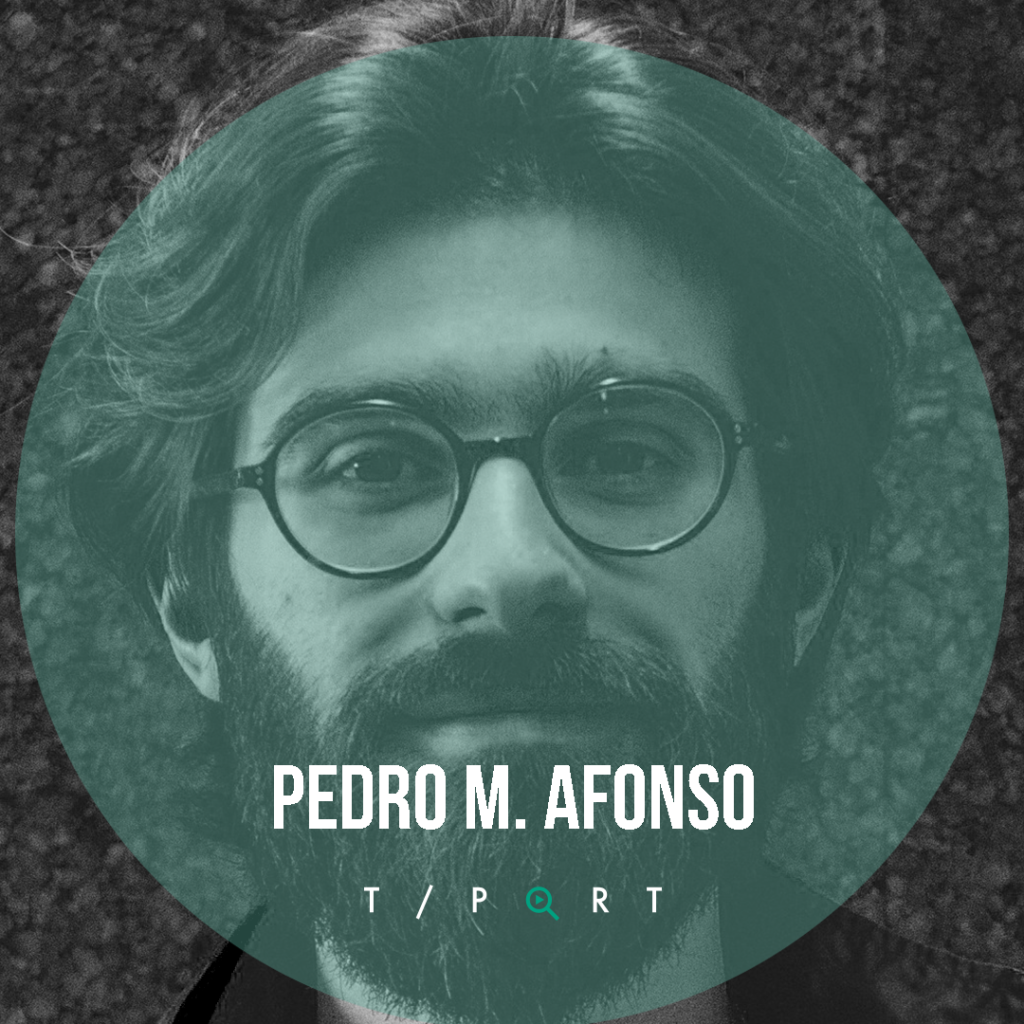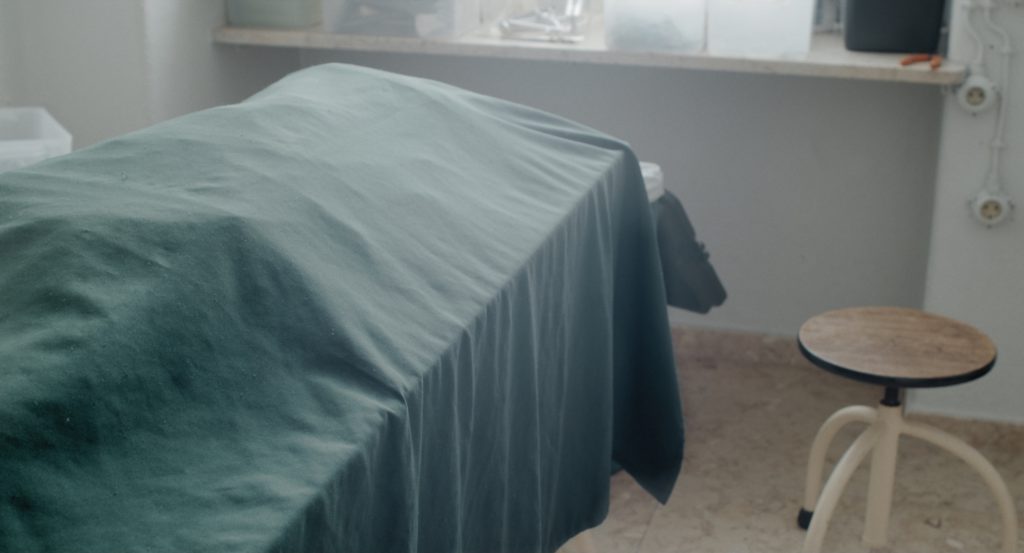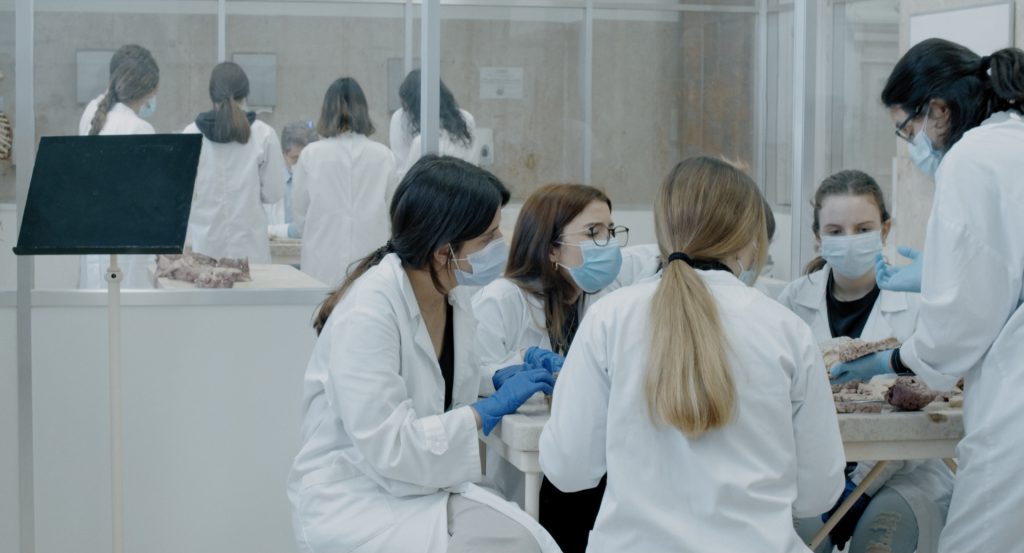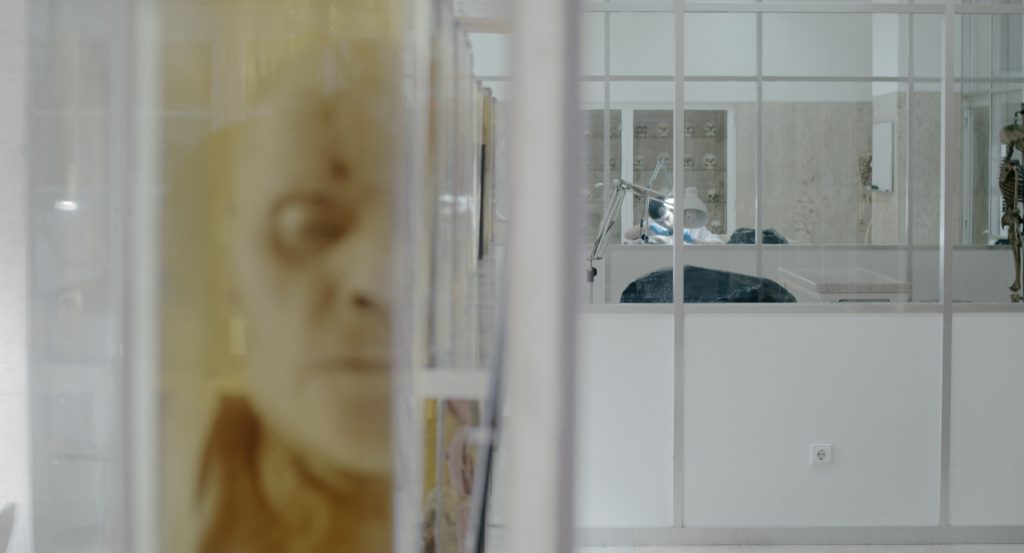
Director Pedro M. Afonso’s short film “To Examine One’s Self” is currently available on T-Port via our partners Festival Formula. The film, which was inspired by practices described by his partner who was studying medicine, proved to be a “transformational process” for Afonso, changing how he saw his own mortality.
We caught up with the Portuguese filmmaker to learn more.
Tell us about yourself
I’m Pedro M. Afonso, 28 years old, and I was born in Braga, Portugal. My primary field of knowledge was Biomedical Sciences but at 23 I left my job to pursue my career as a Director, a long outstanding dream. Graduated summa cum laude from Escola Superior de Media Artes e Design do Porto, in Audiovisual Communications Technologies where I developed a wide set of skills from my artistic practice.
I directed my first short-film in 2020, entitled “The Swap”, which received several national and international nominations and was selected for Prémios Sophia Estudante of the Portuguese Film Academy.
In 2021, my short-film “Interference” was also selected for national and international festivals, specially YMOTION in Portugal. Recently I began developing a drama short-film about a palliative care nurse which has received financial support from the Portuguese Institute of Cinema and Audiovisuals, in collaboration with the production company OPTEC.
Can you tell us about your first encounter with cinema – do you recall your first memory from watching a film?
My weekend afternoons were always filled with movies and series that TV channels used to broadcast in much simpler days. on one hand, I was always an avid consumer of cartoons and being born in the 90’s provided me an unique vantage point to experience the boom of this art; on the other hand, I woke up to Cinema, with capital letter, in my adolescence, upon watching Stanley Kubrick’s The Shining. So I’d say that my experience can be summed up by watching Courage the Cowardly Dog and being mesmerised by the amount of possibilities and emotions that it gave me and later in my life re encountering this passion that had long been gone in one of Kubrick’s masterpieces.
While working on the film, where did you draw your inspiration from?
This movie was a condensation of very different and even contradictory references. On one hand, the work of Frederick Wiseman, specially from his films “Hospital” and “Titicut Follies”, was a big influence in the idea of conveying a social issue through an apparently unbiased lens and view; on the other hand, the divisive work of Stan Brakhage, namely “The Act of Seeing with One’s Own Eyes” was also an influence, specially as a clear example of what path I did not wish to embark on.
Lastly, the works of Errol Morris and Joshua Oppenheimer were big influences in terms of launching myself into the unknown, into a “hostile” situation and trying to capture and create something meaningful that conveys my experience and reaches the audience.
How did you first start working on this film? What was the process like and what first sparked the idea to make this film?
The idea of working on this film came from a conversation with my partner that was studying Medicine at the time. She told me about the Anatomy Classes and the surreal imagery that the students had to withstand. Particularly, one regarding foetuses and their storage in large “tubs” of formalin and the “inhuman” way they handled them.
This dichotomy between creating competent physicians – that must be compassionate, while exposing them to such violent and dissociative imagery and experiences sparked an interest in me.
When in 2020 I had the opportunity to participate in a short course promoted by ISMAI and the University of Texas, called “Death and Documentary”, I thought it would be the right time to pursue this cinematic inquiry. So from there I interviewed my partner, read articles about the impact of the practice of Gross Anatomy in Medical Schools, watched films, journalistic pieces and analysed photographs from the space before I actually took the step forward and went to one of these Anatomical Theatres and confronted myself with everything it encompasses.
Tell us a bit about your film and the filmmaking process – what were your main insights?
So at first I researched the theme, tried to gather as much theory as I could so I’d be able to understand what I was trying to convey with this film and to prepare myself mentally to endure the imagery I’d be forced to see. As I said before, interviews, movies, essays, photojournalistic pieces and so on were important in forming a strategy of approach to this film: which was completely subdued when I started filming.
And this is something that my short experience has given me: films have their own will, they are never quite what we want them to be, apart from issues of form. I went in trying to denounce a mediaeval practice, an impossible way to teach our future generations of physicians and came out with a movie that I hope shows the importance of this practice and how its pitfalls are outweighed by the actual formative knowledge and know-how it provides.
Personally, it was a very transformative process and I do think that I’m now more in touch with myself and my mortality, in a strangely positive way.

What were the biggest challenges you encountered during making your film?
This movie was created during the pandemic, so collaboration processes were gravely undermined. However, I must confess that loneliness and the artistic freedom that it provided me was essential to creating the final result.
Of course access to hospitals and medical Schools was limited, so were classes, which empaired the rhythm and the situations which I could film.
However, one cannot undermine that the biggest challenge was how to deal with the vision of a dead body being dissected, both personally as well as cinematically. I had to create boundaries in which my psyche could function, create a delicate balance between what I permited myself to experience and see as a human being, while balancing it with the camera’s eye, the moral and ethical choices that I had to make in order to capture with respect both students and bodies.
Because in the end, I filmed dozens of dead bodies which anonymously donated themselves to science and it was my duty to protect their image, their memory, while trying to honour the sacrifice they made so we could evolve as a society.
It was really complex to muster the strength to make these decisions on the fly and specially to come back home and watch the footage. Rewatching the dailies was sometimes a very depressing and tough process. Rewatching corpses, now from a distance but with a very focused gaze was sometimes overwhelming, so the process of editing and coming to terms with the final film was in fact very very hard.
How was it to collaborate with your cast and crew? Have you formed any particular meaningful connection from someone from the crew you would like to share?
The crew on set was very small, only myself and sometimes the cinematographer, André Leitão. And of course we shared our opinions both artistically, but essentially, personally of what we were experiencing. I am thankful that I had someone as brave as him to accompany me during this crazy project.
As for the cast, if we can call them so, it was amazing to see different perspectives, such kind people that were completely fine and in touch with the caveats and difficulties of their jobs but just dismissed them and thought of it rather stoically, even if sometimes it just seems straight up sociopathy. They were all amazing, with beautiful and poetic insights and helped me come to terms, in part, with my own mortality.
Tell us about the sound choices in your film – what type of score did you use and why? What other types of sounds did you use ?
During my College years I had the opportunity to meet Filipe Lopes as a teacher and we basically became friends. He was my sound teacher and taught me a lot about the importance of using sound as an element in itself, not just another layer to add to the image. So there was a deliberate effort to create soundscapes from sounds recorded on site, but also from my own memories and experiences of the most important element of the Anatomical Theatre and my own movie: Silence.
Giving weight to silence, giving it presence was my main goal and I partnered up with Nuno Felisberto to work this in post-production after a painstakingly long sound editing process.
As for the score, I was fortunate enough that Filipe, an amazing musician, was interested in participating so we started discussing references. And Hauntology Music, specially created by the musical project The Caretaker (The Shining will forever haunt me) seemed the best way to go. It was only natural to try and create spectres of former memories, of things unsaid and untold, of something that is and isn’t there at the same time. And I’m very proud of the score he created, although I had to be very mindful of using it due to the delicate power balance Silence requested.
Tell us about the visual choices in your film. What were your main goals and techniques in creating the visual style of your film?
Although I did search for a kind of thematic verism and truthfulness that would permeate my linguistic choices especially in the editing room, the formal approach to the film would have to be flawless. Both me and André knew from the beginning that the movie had to be beautiful, even though it would show grotesque images. I was not interested in the language of Wiseman for example, but much more in Benning and Geyrhaltter, because I sincerely believe that contrasting the beauty of the space in which these students dwell with the morbid imagery they experience would be much more impactful.
There was also a deliberate search for vantage points that would allow us to show and to hide at the same time the most grotesque and gratuitous features of the classes.
So symmetrical compositions, a long depth-of-field, mostly static or very slow travelling shots as well as the use of only natural lighting benefited our approach.
It is important to say that the first scene of the movie is the one that most differs from this approach, but there is a specific linguistic and ontological reason for that, but lets leave it at that.

What would you like people to take away from your film?
My main issue with my own film is that I think it draws people to the same conclusion due to the choices I’ve made and also due to my own experience of the place. I would sincerely like that people surprised me with their takes on what they take from the film, especially in their own way of processing grief and dealing with mortality. As I’ve stated before, I didn’t wish to force an agenda onto the spectator, I just want them to look at my film and take their conclusions, make their opinion, to allow themselves to think about this issue without feeling that I’m trying to indoctrinate them. Maybe I’ve failed in that, but what I really desire is that people ponder whatever they think the movie is about.
Tell us about a filmmaker that you admire and why?
There are too many which I admire, but maybe only one that I truly aspire to in a quest that maybe is just too difficult to complete: Michael Haneke. His work is divisive, but it hops between superficial themes to convey messages that unite his body of work into a huge reflection regarding the world and the sadness that crawls beneath it. Albeit the common-place themes such as death, solitude and social alienation, he is able to breathe fresh air and life into these topics and present them in ways that surprise the audience and that break common knowledge about film. His meta-language, his control of the action, the way he provides or withholds information key to the audience, fully in control of his art, is just masterful and to die for. Not literally.
Next to filmmaking, what do you consider as your passions in life?
Philosophy, Music and Literature.
Do these passions influence your filmmaking?
I reckon that all I experience influences my filmmaking. But in a …direct way, yes it does influence largely the way I create and experience cinema. Ideas arise from other media, from reading theories, from dwelling in Philosophy’s meanders and so forth. Every movie I made so far, and I hope that this trend continues, finds some kind of connection path to books that have influenced me, philosophical ideas, artworks, albums, that just clicked with me. I would say that this short-film, for example, came from my studies of stoicism, from Kierkegaard’s studies and books like “The Death of Ivan Ilyich”. So I think I’m just a vessel to all these different paths and knowledges and the work I do tries to arrange some order into it.
Did you have a specific strategy for promoting your film? If so, please tell us about it.
My main aim was to find someone with the knowledge and skill necessary to promote my film. I am a director, I am not a producer or a distributor, and I value each and every role in filmmaking. So I thought that maybe the best way to go was to approach different companies and see how they could help me reach out to the community in a better way.
What do feel young film talents lack the most today, after graduating from film school? Where are the gaps in the film industry?
Film industry cannot live out of short films. And young film talents are urged to create short films to develop their skills but really do not have any idea of promoting themselves in other ways than film festivals. And sometimes it is not enough and surely it is not the best way to measure the value of your work. So it is very time consuming and emotionally painful to get rejected due to different curatorial programmes, length issues, etc etc, and not due to fundamental mistakes in cinematic practice.
I’d say that the promotion and distribution phase is still very much unknown to these film talents, and it’s one of the more important phases in post-production. We should start making the change here also, not only in the works we create, because many masterpieces go into oblivion due to their inability to break into this side of production.
What are your plans and dreams for the future?
This is a tough question because the answer changes with expectations and self-criticism. I’d say that my plan is to continue to make movies that are meaningful to me and that help me expiate some of my deepest fears and worries, while still being able to connect with the audience. We can all dream, and I dream of becoming a reference in my country and reaching one of the big film festivals in the world. But the burden of hope is sometimes distracting and I just prefer to live in this moment and focus on what I can achieve right now.
Is there anything else you would like to mention?
Thank you for reading this very long interview 🙂
Follow Pedro on Instagram / visit his website
Back to T-Port Blog
